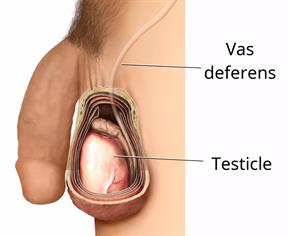Having Trouble Getting Your Partner Pregnant (Male Infertility): What to Know
Infertility is when people have trouble getting pregnant. Male infertility means you're not able to get a female pregnant after a year of having sex regularly without using birth control.
What are the causes?

Male infertility may be caused by:
- Problems with sperm. This can include:
- Problems with the reproductive organs, such as:
Enlarged veins, cysts, or tumors in the testicles.
Injury to the testicles.
Sexual dysfunction.
Low levels of a hormone called testosterone.
- Conditions a person is born with, such as:
- Certain medical conditions. These may include:
Diabetes.
Kidney failure.
Thyroid problems.
Sexually transmitted infections.
Cancer and cancer treatments.
Certain genetic disorders.
Infertility can be linked to more than one cause. In some cases, the cause isn't known.
What increases the risk?
A male's fertility decreases with age. Other things may also make you more likely to have infertility. These include:
- Lifestyle choices such as:
Using products with nicotine or tobacco.
Drinking too much alcohol.
Exposing the testicles to heat often. This can happen with frequent use of a hot tub or sauna.
Using drugs such as anabolic steroids, cocaine, or marijuana.
Being around harmful chemicals or toxins.
- Health issues like:
How is this diagnosed?
Male infertility may be diagnosed using:
As part of diagnosing infertility, both partners will have a physical exam. They will also have their medical and sexual history taken.
How is this treated?
Treatment depends on the cause. Most cases of infertility are treated with medicine or surgery.
- You may be given medicine to:
- Surgery may be done to:
Follow these instructions at home:
Lifestyle
-
If you drink alcohol, limit how much you have to 0–2 drinks a day.
-
Do not smoke, vape, or use nicotine or tobacco.
-
Make changes to your diet if needed to lose weight or stay at a healthy weight. Work with your health care provider and an expert in healthy eating called a dietitian. They can help you set a weight-loss goal that's right for you.
-
Find ways to reduce stress that work well for you. Some good options include regular physical activity, meditation, or deep breathing.
General instructions
-
Take your medicines only as told.
-
Get support from a counselor or support group. Couples counseling may be helpful for you and your partner.
-
Keep all follow-up visits. Your provider will check hormone levels and see how your treatment is going.
Contact a health care provider if:
This information is not intended to replace advice given to you by your health care provider. Make sure you discuss any questions you have with your health care provider.
 Male infertility may be caused by:
Male infertility may be caused by: